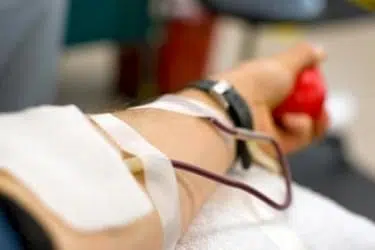April 22nd, 2020- Attorney General Kwame Raoul, as part of a coalition of 20 attorneys general, is urging the Food and Drug Administration (FDA) under the U.S. Department of Health and Human Services to enact guidance that will help medical facilities nationwide maintain adequate blood supplies during the COVID-19 pandemic.
In comments submitted today, Raoul and the attorneys general argue that the FDA’s recent guidance easing donor eligibility restrictions on blood donations from the LGBTQ population – specifically gay and bisexual men – is a step in the right direction, but the guidance does not go far enough in light of the COVID-19 public health emergency. Raoul and the coalition are calling on the FDA to revise its guidance to move toward a risk-based, gender-neutral screening model that makes it easier for the LGBTQ population to donate blood and plasma, and better ensure that the nation’s blood supply can meet the current increased demand.
“At a time when medical facilities throughout the country are experiencing an unprecedented need due to the coronavirus, the FDA must offer guidelines that allow all eligible donors to safely donate lifesaving blood and plasma,” Raoul said. “When so many lives are at stake, the FDA should lift discriminatory restrictions that prevent healthy donors from coming to the aid of their loved ones and neighbors.”
According to America’s Blood Centers, a nonprofit organization that represents community blood centers that collect nearly 60 percent of the nation’s blood supply, blood drives and donations have dropped significantly during the COVID-19 health crisis. National Geographic reported in March that more than 4,000 blood drives across the country had been canceled due to coronavirus concerns and closures of schools and workplaces where drives are usually held, resulting in more than 100,000 fewer blood donations. The American Red Cross, which provides approximately 40 percent of the nation’s blood and blood components, recently reported having less than a five-day blood supply on hand.
The American Red Cross estimates that on average every day, the United States needs approximately 36,000 units of red blood cells, nearly 7,000 units of platelets, and 10,000 units of plasma to provide blood transfusions for major surgeries, treat patients and victims of trauma, and more.
In response to the COVID-19 crisis, the FDA recently issued revised blood donor eligibility guidance, particularly related to donors from the LGBTQ community. Under the new guidance, gay and bisexual men must wait three months, which is a decrease from 12 months, after sexual activity before they can donate blood. Raoul and the coalition state that while the update is a step toward increasing blood donations made by healthy bisexual and gay men, it does not go far enough during a time when the nation’s supply of blood and blood products is at risk of collapsing due to the COVID-19 pandemic. Data from the Williams Institute at the UCLA School of Law indicates that lifting restrictions completely would produce more than 2 million additional eligible blood donors, including nearly 175,000 likely blood donors, and nearly 300,000 pints of additional donated blood annually.
Attorney General Raoul and the coalition also argue that moving toward a risk-based model, rather than one based on gender, is not only more appropriate to address the country’s needs, but is also more in line with laws that protect against discrimination. A population-based policy singling out bisexual and gay men contradicts equal protections contained in the Constitution’s Fifth and 14th Amendments.
Joining Raoul in submitting the comments are the attorneys general of California, Colorado, Connecticut, Delaware, the District of Columbia, Hawaii, Iowa, Maine, Massachusetts, Michigan, Minnesota, Nevada, New Jersey, New Mexico, New York, Oregon, Pennsylvania, Vermont, and Virginia.
Please visit the American Red Cross’ website to locate a blood drive near you.

